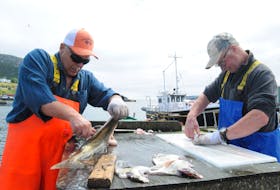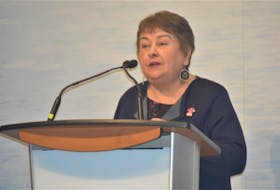ST. JOHN'S, N.L. — Get ready, Atlantic Canada — it’s going to be one hell of an election campaign.
After a Liberal wave washed across the rocky shores of the region in 2015, how can Liberal Leader Justin Trudeau’s opponents eat into the historically strong Liberal support here?
Can Conservative Party of Canada Leader Andrew Scheer rebound after being shut out?
Will New Democratic Party Leader Jagmeet Singh have any presence in the region after Oct. 21?
Can Green Party Leader Elizabeth May win her party’s first seat in the region?
What do the polls say?
The most recent Atlantic Canada-wide poll from Narrative Research suggests a Liberal lead overall, as of Aug. 22. Narrative’s poll found 43 per cent support for the Liberals (up from 39 per cent in a May 24 poll), 30 per cent support for the Conservative Party of Canada (down from 36 per cent in the May poll), 15 per cent support for the Green Party (up from 14 per cent in May), and 10 per cent support for the NDP (up from nine per cent in May).
Don Mills, CEO of Narrative Research, doesn’t think the sweep will hold.
“There’s zero chance of that happening. Looking at the most recent data from Narrative research, the numbers would suggest that the Liberals are going to lose probably a dozen seats in the region,” said Mills.
“Not equally across the region, by the way, but they’re going to lose a significant portion of their Atlantic caucus.”
At the provincial level, MQO Research found just one poll that had the Conservatives leading in any province in the region over the last year.
According to the MQO polls, the Liberals have had anywhere from 56 per cent support to as low as 36 per cent support. That poll showed Conservatives held 39 per cent support in New Brunswick as of May 6, ahead of the Liberals by three points in that poll. The Conservative lead gave way to a statistical tie in an Aug. 14 poll, where the Liberals and the Conservatives had 41 per cent and 40 per cent support, respectively.
“We could see a fair bit of movement... there’s a fair bit of Conservative strength throughout the Atlantic provinces.” — Kelly Blidook
Mills said immigration and health care are two issues he expects to see at the forefront of the coming election campaign.
Atlantic Canada has a disproportionately older population compared to the rest of the country, says Mills, but the population of the region hasn’t increased in a noticeable way since 2015. Mills says the trouble there is that it’s easy to promise on health care, but harder to follow through.
“There’s always promises on health care. The question is who’s going to actually deliver something that will make a difference,” he said.
Memorial University political scientist Kelly Blidook says it’s hard to make too many assumptions when comparing provincial and federal elections, but there are seats up in the air.
“We could see a fair bit of movement. Usually, you can go back and look at not just a single election, but multiple elections. You can see there’s a fair bit of Conservative strength throughout the Atlantic provinces,” said Blidook.
“There was a number of MPs that won reasonably handily in 2011, then lost marginally in 2015. So, I would say there almost certainly will be some movement, even if we can’t predict which and of what type.”
One clue as to what’s to come could lie in the recent provincial elections held throughout the region.
After the 2015 federal election, all the legislatures in Atlantic Canada were led by Liberals, some with more comfortable majorities than others.
Two of the four legislatures have changed faces since the 2015 federal election, as the Progressive Conservatives and leader Blaine Higgs eked out a minority government in New Brunswick, while P.E.I.’s Conservative Party led by Dennis King emerged with a minority government, toppling a Liberal majority. While many expected the P.E.I. Green Party to have their first chance in government, the party came up short, but an eight-seat performance was enough to lead the province’s opposition.
In Newfoundland and Labrador, the Liberals went from a dominating 31-seat majority to a 20-seat minority in the general election held this past May.
RELATED









